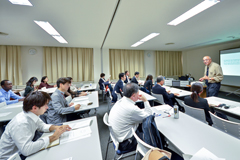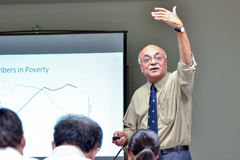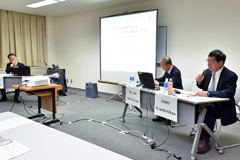What New Challenges Face the World in Achieving Quality Growth? A Post-TICAD7 Event Discusses
2019.12.24
On Dec. 3, 2019, JICA Research Institute (JICA-RI) hosted the post-TICAD7 event "The Quality of Growth in Africa" at the JICA Ichigaya Building, featuring Professor Ravi Kanbur of Cornell University. Commentators were Professor Kenichi Ohno of the National Graduate Institute for Policy Studies, and from JICA-RI, Senior Research Advisor Akio Hosono and Visiting Scholar Go Shimada (associate professor at Meiji University).
JICA-RI Deputy Director Yasuo Fujita said in his opening speech that the book "The Quality of Growth in Africa," published in August 2019, is the fourth book resulting from a joint research project between JICA-RI and the Initiative for Policy Dialogue (IPD) based at Columbia University that began in 2008. He said the event with Kanbur, one of the editors of the book, would go beyond the volume's content to provide an invaluable opportunity to discuss quality growth and transformation, not only in Africa, but also around the world.

The discussion on quality growth spurred many questions from the audience members
Kanbur gave the keynote speech, entitled "Past, Present and Future of the Quality of Growth: In the World and In Africa," and presented two major topics: new challenges facing the world and international cooperation for Africa.
First, he said that despite the fact that the past 70 years since World War II have been "the best of times" marked by improvements in social and economic indicators such as per capita GDP and no world wars or similar conflagrations, the world is now faced with major concerns that threaten quality of growth. He cited the following as factors behind the concerns: the rich getting richer, the poor doing poorly and middle class income stagnating; the poverty rate in Africa has fallen, but the absolute number of the impoverished has risen; and the number of international migrants has been increasing.

Professor Ravi Kanbur of Cornell University gave the keynote speech
In addition, Kanbur focused on three new challenges that the world should address: (1) labor-displacing technical change and inequality; (2) the cross-border spillover effects of various challenges and the limitations of national policies; and (3) a global institutional vacuum. He said technological progress has increased inequality between skilled and unskilled labor. In addition to labor, addressing national level inequality through national policies will be ineffective unless cross national agreements can be reached on a range of tax, investment and climate change issues. In addition, global institutions, such as the World Bank, have not been able to address these issues, he said.
Next, with regard to international cooperation in Africa, he posed a question: Can the experience of successful development in East Asia can offer lessons to Africa in this rapidly changing world? Cooperation agencies have traditionally implemented country-specific development programs, but now face a variety of cross-border challenges. ”While some elements of development cooperation will still be valid, many elements will need to be questioned and scrutinized carefully to make sure they reflect the challenges of the future, not just the successes of the past,” he said.
Hosono said, in response to the keynote speech, that quality of growth needs to be discussed in the context of "transformation." For example, a free trade agreement within the African continent and the development of cross-country economic corridors could be the first steps towards promoting investment, expanding markets, driving industrial transformation and reducing regional inequality.
Ohno commented that he believes policies based on country-specific approaches are still effective in addressing issues such as inequality, employment and environment. He said he agrees with the importance of taking on new challenges, but the relative importance of traditional challenges is still large enough.

From left, JICA-RI Visiting Scholar Go Shimada, Senior Research Advisor Akio Hosono and Professor Kenichi Ohno of the National Graduate Institute for Policy Studies
Shimada also weighed in: In Africa, the number of natural disasters caused by climate change is rapidly increasing, which is having a serious impact on agriculture. Air pollution is already worsening in cities, he said. Africa bears little responsibility for climate change, and developed countries need to support green industry policies that balance economic growth with the environment.
At the end of the event, many audience members asked questions and a meaningful discussion took place.

事業事前評価表(地球規模課題対応国際科学技術協力(SATREPS)).国際協力機構 地球環境部 . 防災第一チーム. 1.案件名.国 名: フィリピン共和国.

事業事前評価表(地球規模課題対応国際科学技術協力(SATREPS)).国際協力機構 地球環境部 . 防災第一チーム. 1.案件名.国 名: フィリピン共和国.

事業事前評価表(地球規模課題対応国際科学技術協力(SATREPS)).国際協力機構 地球環境部 . 防災第一チーム. 1.案件名.国 名: フィリピン共和国.

事業事前評価表(地球規模課題対応国際科学技術協力(SATREPS)).国際協力機構 地球環境部 . 防災第一チーム. 1.案件名.国 名: フィリピン共和国.

事業事前評価表(地球規模課題対応国際科学技術協力(SATREPS)).国際協力機構 地球環境部 . 防災第一チーム. 1.案件名.国 名: フィリピン共和国.
scroll